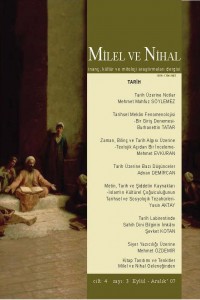Abstract
It is expected from historian to detect the historical phenomena accurately that took place in the past and to make analysis, considering the relationship between them. In doing so, historian usually presents himself as objective. However, how far is it possible to be so? This article is dealing with the following questions: Is it possible for historian to be objective? What are the primary reasons that lead historian to be subjective? How do the geographical environment and the time period in which historian lives influence the perception of historian over the historical phenomena? Is it possible that all information and evidences about the past might be accessible to historian? How significant is the exploration of cause-and-effect relationship in the historical phenomena? What are the benefits of history? Has history been –and is it still- used as a means to construct identity?
Keywords
Abstract
Tarihçinin, geçmişte meydana gelen olguları doğru bir şekilde tespit etmesi ve olgular arasındaki ilişkileri dikkate alarak yorumlar yapması beklenir. Tarihçi, olguları tespit ederken ve yorumlar yaparken nesnellik iddiasıyla yola çıkar. Ancak bu, ne kadar mümkündür? Bu makalede, tarihçinin nesnelliğinin mümkün olup olmadığı, tarihçiyi öznelliğe sürükleyen belli başlı etkenlerin neler olduğu, yaşadığı coğrafyanın ve zamanın tarihçinin olgulara bakışını nasıl etkilediği, geçmişe ait olgular hakkındaki bilgi ve belgelerin tamamının tarihçiye ulaşmasının mümkün olup olmadığı, olgular arasındaki sebep-sonuç ilişkisinin ele alınmasının önemi, tarihin yararlarının neler olduğu, geçmişte ve günümüzde tarihin bir kimlik inşa aracı olarak kullanılıp kullanılmadığı gibi konular üzerinde durulmaktadır.
Details
| Primary Language | Turkish |
|---|---|
| Journal Section | Makaleler |
| Authors | |
| Publication Date | June 1, 2007 |
| Submission Date | November 5, 2014 |
| Published in Issue | Year 2007 Volume: 4 Issue: 3 |


